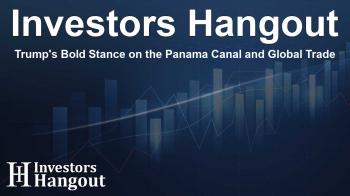Trump's Bold Stance on the Panama Canal and Global Trade

Trump's Controversial Remarks
Recently, Donald Trump made waves with his bold claim about the Panama Canal. Speaking at an event, he accused Panama of charging excessive fees for passage through this vital waterway, which has long been a critical artery for global trade. His comments drew ire from Panamanian President Jose Raul Mulino, who firmly defended the sovereignty of his nation.
Defense Against Possible Foreign Influence
During his speech, Trump voiced concerns about potential Chinese influence over the canal, asserting that he would not allow it to fall into what he termed the "wrong hands." His remarks echoed a growing sentiment in his address, suggesting that strong measures might be necessary to safeguard U.S. interests in the region. Despite the longstanding management responsibilities held by a Hong Kong-based company, Mulino emphasized that Panama maintains its independence and control over the canal.
The Historical Context of the Panama Canal
The Panama Canal, built in the early 20th century, has always been a symbol of American engineering and diplomacy. For decades, the United States administered the canal until it was handed back to Panama in 1999 under agreements made in 1977. Trump’s comments reflect a notable departure from traditional diplomatic dialogue, hinting at a potential shift in U.S. foreign policy under his leadership.
Implications for U.S. Trade and Diplomacy
The canal is not just a geographical feature; it is essential for maritime trade. Approximately 14,000 ships navigate through it each year, facilitating around 2.5% of global trade. Trump's allusion to a potential reassertion of U.S. control raises questions about how such actions would fit within the current framework of international law and trade agreements. Experts are left wondering about the ramifications for U.S. imports and exports, particularly of goods transported via container ships from Asia.
Responses from Panama
In retaliation to Trump’s claims, Mulino issued a statement highlighting Panama's historical and legal claim to the canal. He reiterated that every inch of the territory surrounding the canal is a part of Panama and will continue to belong to the Panamanian people.
Trump's Vision for American Expansionism
This incident isn't isolated; it reflects a pattern of Trump's consideration regarding American expansionism. Not too long ago, he considered the possibility of Canada becoming the next U.S. state and even expressed interest in purchasing Greenland. His statements during his term as president indicated a longstanding fascination with global geography, yet they often lack feasible paths for realization.
National Security and Geopolitical Strategy
In light of his comments, Trump suggested, via social media, that overseeing territories like Greenland is vital for American national security. This idea resonates with his supporters who believe a strong stance on such matters showcases America’s assertiveness on the world stage.
Conclusion
The conversation around the Panama Canal encapsulates broader themes of national pride, international diplomacy, and the significance of trade routes in shaping global policy. As the situation develops, it will be crucial to monitor how Trump’s political maneuvers influence not only U.S.-Panama relations but also the overall dynamics of international trade.
Frequently Asked Questions
What did Trump say about the Panama Canal?
Trump claimed that Panama is charging excessive rates for canal passage and hinted at a desire to regain control over the canal.
How does the Panama Canal impact global trade?
The canal allows up to 14,000 ships to pass annually, crucial for shipping goods between oceans and significantly contributing to global trade.
What was Mulino's response to Trump's comments?
President Mulino stated that Panama's independence is non-negotiable and defended the canal's administration against foreign influence.
Why is Trump's statement considered unusual?
It's uncommon for a U.S. leader to suggest reclaiming territory from a sovereign nation, marking a shift in diplomatic rhetoric.
What are the historical ties between the U.S. and the Panama Canal?
The U.S. constructed and controlled the canal until it was handed over to Panama in 1999 under treaties signed in 1977.
About Investors Hangout
Investors Hangout is a leading online stock forum for financial discussion and learning, offering a wide range of free tools and resources. It draws in traders of all levels, who exchange market knowledge, investigate trading tactics, and keep an eye on industry developments in real time. Featuring financial articles, stock message boards, quotes, charts, company profiles, and live news updates. Through cooperative learning and a wealth of informational resources, it helps users from novices creating their first portfolios to experts honing their techniques. Join Investors Hangout today: https://investorshangout.com/
Disclaimer: The content of this article is solely for general informational purposes only; it does not represent legal, financial, or investment advice. Investors Hangout does not offer financial advice; the author is not a licensed financial advisor. Consult a qualified advisor before making any financial or investment decisions based on this article. The author's interpretation of publicly available data shapes the opinions presented here; as a result, they should not be taken as advice to purchase, sell, or hold any securities mentioned or any other investments. The author does not guarantee the accuracy, completeness, or timeliness of any material, providing it "as is." Information and market conditions may change; past performance is not indicative of future outcomes. If any of the material offered here is inaccurate, please contact us for corrections.
